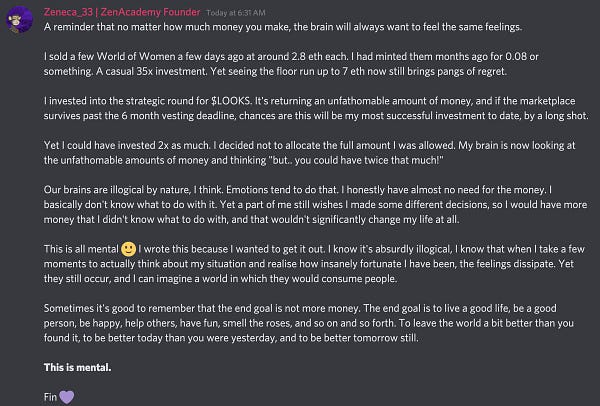Web3 Wednesday: The Decentralization Debate Continues, The Psychology of NFTs, Opensea & More 👀 💰 🎤
Issue #4
Join the creators, students, early career professionals, founders, executives, and more focused on learning and empowering each other on web3 concepts by subscribing below.
My goal is to bring diverse minds together to accelerate our web3 education to build a better future. My hope is that these recaps will be in service of that objective.
Here is today’s roadmap:
Article: The web3 debate continues 👀
Tweet: How much money is enough? 💰
Podcast: Opensea Founder Devin Finser 🎤
P.S. If you are new here, take a look through this web3 starter guide to get caught up to speed :)
Article:
Web3 - Scott Galloway
It is funny being the ‘crypto person’ these days. Any interesting article on web3 gets sent your way. This past weekend Scott Galloway’s article was in my LinkedIn inmail, my email, and in my texts. After a long weekend skiing with friends, I jumped in. Here are a few takeaways:
Galloway is an NYU professor and tech personality. He has a strong following but has been ridiculed for being a poor investor. Since October 2019, the companies Galloway predicted would fail have outperformed the S&P500 by 61% (source).
Despite this, he shared important hesitations of web3 including the fact that:
The top 9% of accounts hold 80% of NFTs on Ethereum.
Most web3 platforms are still centralized (like we spoke about last week).
Most web3 technologies will be evolutionary vs revolutionary in nature.
Centralization is not inherently a negative thing. Nearly all of our recent advancements in technology have come from centralized entities (e.g. Nasa, The United States, even Coinbase).
Crypto Twitter got upset with this piece. Packy, whose articles on The Great Online Game I’ve shared before, wrote a rebuttal to Galloway’s piece titled The Web3 Debate. Below were his takes:
Decentralization is not the only key feature of web3. The important innovation in web3 is evolving the internet to be owned by builders and users, orchestrated with tokens.
Regardless of which platform is centralized or not, the fact that the data is available to anyone to build on top of, or for users to port to different applications, means that there is more choice.
Despite Galloway calling out a lack of regulation in web3, most founders want more regulatory guidance instead of less.
Most of life is a paradox. I like routine and I like change. I want to live in SF and I want to travel. I’m confident and I am doubtful of my skills. I like to connect with people and I like to be alone. The fact that much of life lives in the grey area is also what makes web3 so interesting. If you look deep enough you can see the potential of these new technologies, or you might see the opposite. Just like any new technology (e.g. social media), both can be true. It’s up to the early builders and users to dictate which direction this goes.
Web3 can provide ownership to more users and still be quite centralized. NFTs can provide economic opportunity to more creators and still the top 9% of holders can hold 80% of them. DAOs can give equal ownership to their users whilst being managed and run by a small minority of contributors.
People feel the need to pick a side. Like most areas of life, the reality of web3 is somewhere in the middle (albeit trending positively). Instead of trying to state why the other side is wrong let’s try to learn from one another. The wisdom of web2 can help web3, and the innovative thinking of web3 can help web2.
Web3 is happening regardless of whether we want it to or not. Let’s build a better future through having healthy conversations by listening and seeking to understand.
Tweet:
Understanding your psychology in relation to money is important. So much of my own thinking around finances comes from a lack of money in my childhood. Being aware of how my own psychological influences impact my financial decision-making has been important in managing my investments, and my subsequent mental health.
Zeneca is one of the most prolific NFT investors today. I love his writing because he opens up about what it feels like to make life-changing money on web3 investments, and how at times it still feels like it's not enough. Especially for those still trying to make it, it’s important to have these POVs in mind to ensure you’re not climbing the wrong mountain.
Podcast:
20VC: Opensea Founder Devin Finzer
Opensea grew from $150M to $3B in gross market value in 18 months. The speed at which they achieved this scale is remarkable. I like listening to Devin because he seems pretty down to earth despite his seemingly overnight success.
Listen to it on Apple Podcasts or Spotify.
Bonus:
"You Don't Own Web3": A Coinbase Curse and How VCs Sell Crypto to Retail
Coinbase NFT Marketplace Will Enable Purchases With Mastercard
That does it for this week of Web3 Wednesdays.
Till next time,
Jay 💕



